Uncategorized
The Next Decade of Enterprise: Top B2B SaaS Companies to Watch (2025 Trends)

The world of business technology moves at warp speed, and the B2B SaaS (Business-to-Business Software as a Service) market is the engine driving that change. For companies—from agile startups to sprawling enterprises—choosing the right SaaS platforms is no longer a matter of convenience; it’s a non-negotiable factor for survival and growth.
As we look ahead, the landscape is being radically reshaped by sophisticated AI, a relentless focus on data, and the growing demand for specialized solutions. This post is your essential guide to the Top B2B SaaS Companies that aren’t just leading the market today, but are aggressively defining the trends of tomorrow. We’ll dive into the SaaS industry leaders, the SaaS startups to watch, and the key metrics driving their success.
Why the B2B SaaS Market is Ripe for Disruption
The global B2B SaaS market is predicted to continue its explosive growth, potentially exceeding an 11% Compound Annual Growth Rate (CAGR). This isn’t random. It’s a direct result of businesses committing fully to digital transformation across every department—from sales and marketing to HR and finance.
The shift toward cloud-based business solutions means companies can deploy powerful tools instantly, scale up or down easily, and benefit from continuous updates. This efficiency has made software subscription models the backbone of the modern economy.
Key Metrics Driving This Growth
To gauge the performance and potential of these companies, experts look past simple revenue numbers and focus on core financial health signals, satisfying informational search queries about market metrics:
- Annual Recurring Revenue (ARR): The lifeblood of any SaaS company, representing the predictable revenue stream from subscriptions. High ARR growth signals market dominance.
- Net Revenue Retention (NRR): Often considered the most crucial metric. An NRR above 120% means the company is making more money from its existing customers (through upsells and expansions) than it is losing from churn—a sign of excellent product-market fit.
- Customer Acquisition Cost (CAC): How much a company spends to acquire a new paying customer. A low CAC paired with high NRR signals a healthy, scalable business model.
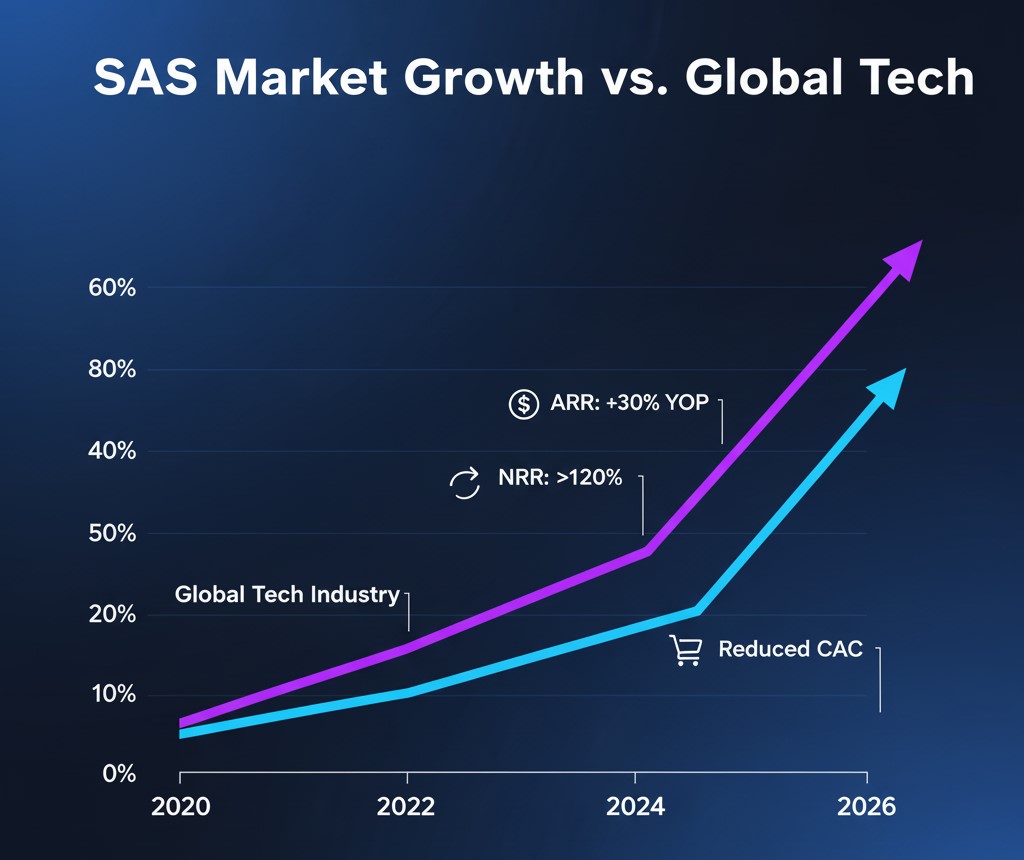
Emerging Trends Shaping the Top SaaS Players
The companies on our watch list aren’t successful by accident. They are pioneers, embracing the B2B software trends that are fundamentally changing how work gets done.
The Generative AI & Automation Revolution
The most significant trend is the mass integration of Generative AI and business process automation. The future of work involves AI not just as a tool, but as a co-pilot embedded within the software itself.
- In CRM: AI now analyzes customer communication, predicts churn risk, and automatically suggests optimal actions for sales teams.
- In Productivity: AI-powered B2B SaaS tools automate everything from scheduling and note-taking to drafting emails and generating code.
This focus on intelligent features is moving SaaS from being a system of record to a system of intelligence.
The Rise of Vertical SaaS (V-SaaS)
For years, horizontal platforms (like general CRM or accounting software) dominated. Now, we are seeing the acceleration of Vertical SaaS—software designed specifically for a single industry (e.g., HealthTech, FinTech, Construction).
Vertical platforms are highly important because they speak the language of a specific industry, handle its unique compliance needs, and integrate with its specialized tools. This laser focus results in better solutions, stronger customer loyalty, and typically higher NRR figures.
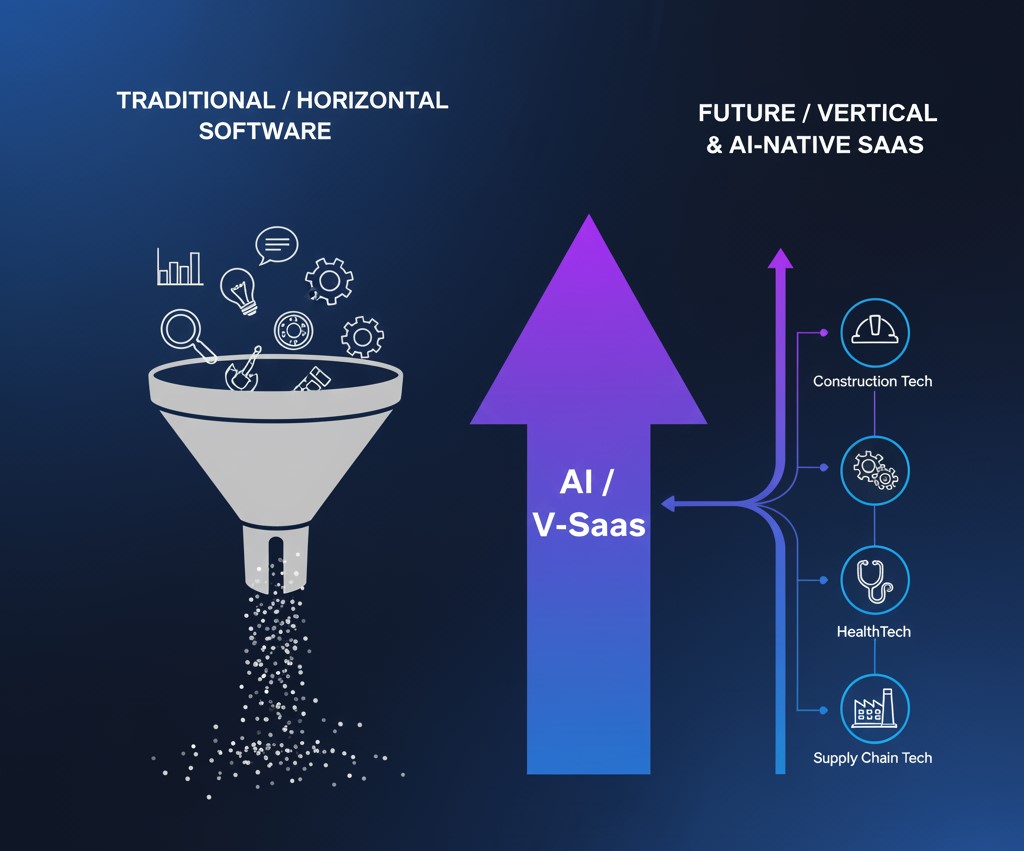
The Market Leaders to Watch (The Enterprise Giants)
These SaaS industry leaders have cemented their dominance but continue to innovate at a breakneck pace, ensuring their platforms remain essential to the global Enterprise tech stack.
Salesforce: The CRM Ecosystem Innovator
Salesforce remains the undisputed champion of Customer Relationship Management (CRM). Their secret lies not just in their core Sales Cloud, but in their extensive ecosystem. By integrating AI-powered features like Einstein, they are moving beyond simple data tracking to real-time predictive insights. Their acquisition strategy (like Slack and Mulesoft) has turned them into a comprehensive platform for the entire digital headquarters, making them a one-stop shop for businesses looking to enhance their customer experience and marketing efficiency.
ServiceNow: The Workflow Automation King
ServiceNow is the gold standard for IT Service Management (ITSM) and business process automation. They are watching the entire flow of work across an organization and identifying areas for optimization. They are rapidly expanding beyond IT into Customer Service Management (CSM) and Human Resources (HR) management, all leveraging their core strength in managing complex workflows with low-code/no-code platforms for customization. Their platform is foundational for any large organization focused on digital efficiency.
The Fastest-Growing Mid-Market Disruptors
While the giants battle for enterprise dominance, a collection of highly agile fastest growing SaaS companies is winning the hearts and wallets of the mid-market and SMBs by offering powerful, easy-to-use platforms.
HubSpot: All-in-One Growth Platform
HubSpot is the champion of inbound methodology, offering a comprehensive CRM and marketing suite. What makes them an essential company to watch is their commitment to the “Platform” model. They have successfully unified marketing, sales, service, and operations into a seamless experience. For small business owners and scaling companies, HubSpot’s all-in-one approach significantly lowers the Total Cost of Ownership (TCO) compared to integrating multiple disparate tools.
Snowflake: The Cloud Data Warehouse Pioneer
Data is the new oil, and Snowflake is building the modern pipeline. Their revolutionary “Data Cloud” architecture separates computing and storage, allowing businesses to scale their data analytics instantly and affordably. Snowflake has become indispensable for any company focused on Data Analytics and large-scale cloud computing, establishing them as a core part of the modern data infrastructure.
Atlassian (Jira/Confluence): The Collaboration Powerhouse
If a team practices agile development or manages complex projects, they are likely using Atlassian products. Jira and Confluence are the standard for software development and internal knowledge management. Their suite excels at B2B collaboration platforms, helping teams manage tasks, share knowledge, and integrate with thousands of other tools. They represent the continuing importance of software that facilitates the fundamental act of team collaboration.
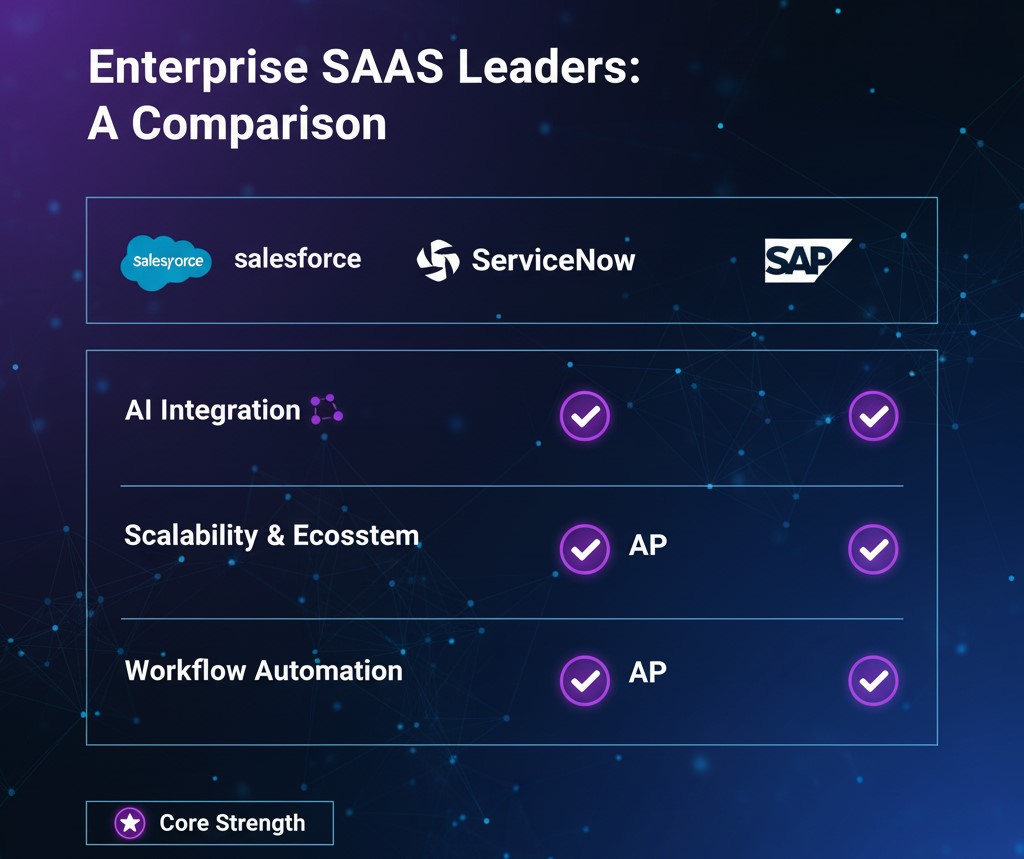
Specialized B2B Tools Making a Massive Impact
Beyond the major platforms, several highly specialized tools are driving niche innovation and proving to be essential purchases for modern businesses:
- Ahrefs/Semrush (SEO & Marketing Intelligence): Critical MarTech (Marketing Technology) tools that allow businesses to analyze competitors, identify high-intent keywords, and execute their digital marketing strategies effectively.
- Gusto/Deel (HR Tech & Payroll): With the rise of the global, hybrid workforce, tools that simplify payroll, benefits, and compliance for remote teams are booming, making this segment of HR Tech incredibly vibrant.
- ClickUp/Notion (All-in-One Productivity & Workspace): These flexible platforms combine note-taking, task management, and databases, replacing multiple older productivity apps and appealing to teams who want a highly customizable system.
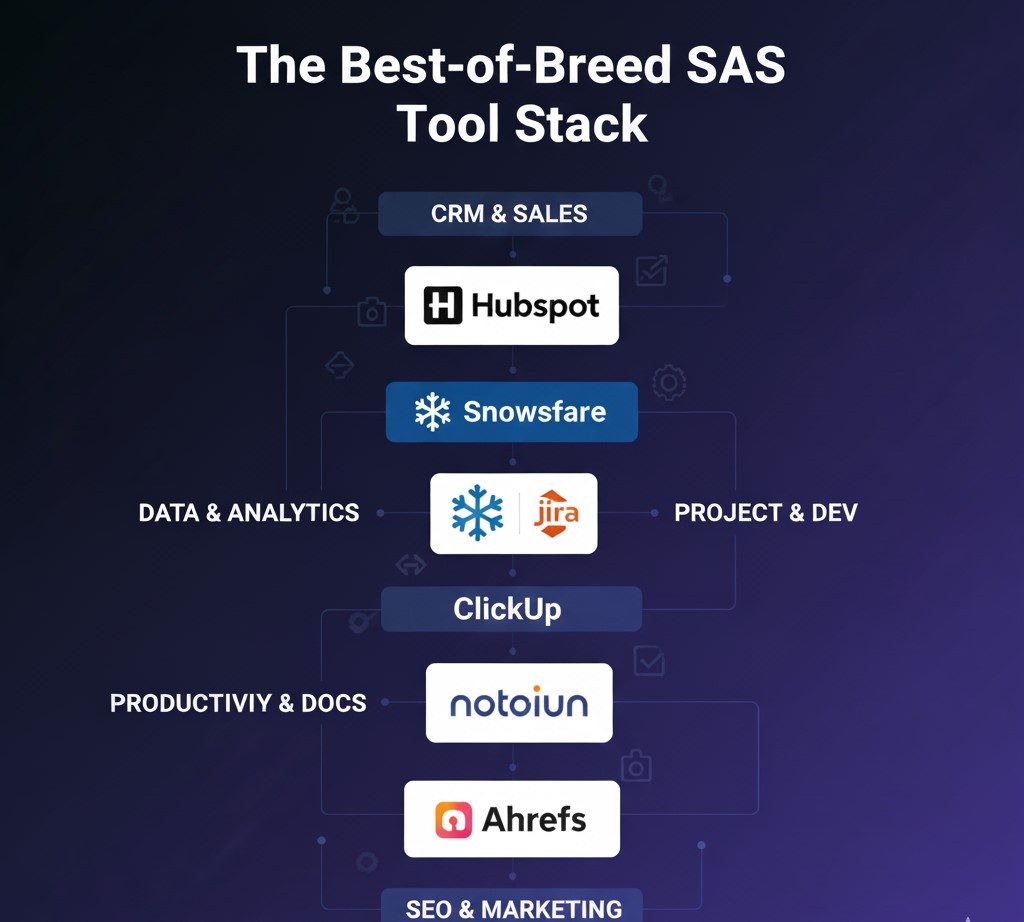
Getting the Best Deals on Essential B2B SaaS
The tools listed above represent a significant, often essential, investment. For growing businesses, managing SaaS spend is a major operational challenge. It’s crucial to optimize your budget by hunting for the best deals, exclusive offers, and negotiating discounts, especially when committing to an annual plan.
Many of these B2B software platforms run promotions or offer special terms that aren’t widely advertised. This is where a resource dedicated to aggregating and curating these deals becomes invaluable.
To ensure your business gets maximum value without overspending on essential tools, always check platforms that aggregate the latest software offers and subscription deals. We highly recommend visiting https://offerlooters.com/ to find curated, exclusive discounts on many of the B2B platforms mentioned here, helping you optimize your SaaS spend and make your budget go further.
[“Find Exclusive SaaS Discounts Now at https://offerlooters.com/“.]
How to Choose the Right B2B SaaS for Your Business
Navigating the crowded B2B SaaS space requires a strategic approach. Here is a brief guide for making your next purchasing decision:
- Prioritize Integration Capability: Your new tool must integrate seamlessly with your existing tech stack (CRM, ERP, Finance software). Look for platforms with open APIs that promise easy integration.
- Assess Total Cost of Ownership (TCO): Don’t just look at the subscription price. Factor in onboarding fees, customization costs, training time, and the long-term cost of migrating data if you ever decide to switch.
- Future-Proofing (AI/ML): Choose platforms that are actively investing in Machine Learning (ML) and AI integration. These tools will evolve faster and provide better predictive capabilities than legacy systems.
- Security, Compliance, and Governance: Especially for enterprise-level tools, ensure the provider meets stringent security standards (e.g., SOC 2, ISO 27001) and adheres to global data privacy laws.
Conclusion: The Future is Integrated and Intelligent
The B2B SaaS companies to watch are those prioritizing intelligence, specialization, and integration. From giants like Salesforce and ServiceNow to hyper-focused disruptors in Vertical SaaS and AI-powered B2B SaaS tools, the landscape is competitive and constantly rewarding innovation.
By understanding the key trends, focusing on smart metrics, and proactively seeking out value—remember to check out https://offerlooters.com/ for cost-saving deals—your business can leverage these powerful platforms to automate operations, unlock data insights, and secure a competitive edge in the next decade.
Frequently Asked Questions (FAQs)
1. What is B2B SaaS, and why is it growing so fast?
B2B SaaS (Business-to-Business Software as a Service) is cloud-based software sold on a subscription model to other companies. Its rapid growth is fueled by the need for business process automation, the shift to cloud computing, and the integration of advanced technologies like AI to improve operational efficiency and customer engagement.
2. How is AI impacting the B2B Software-as-a-Service market?
Generative AI is fundamentally transforming B2B SaaS by enabling sophisticated automation, powering predictive analytics (e.g., for Customer Relationship Management), and embedding AI co-pilots directly into business workflows for tasks like coding, content generation, and sophisticated data analysis.
3. Which B2B SaaS categories are showing the fastest growth?
The fastest-growing B2B SaaS categories currently include Vertical SaaS (industry-specific platforms like FinTech or HealthTech), Cybersecurity tools driven by increased compliance needs, and platforms specializing in Data Analytics/Cloud Data Warehousing (like Snowflake).
4. How can a small business afford top-tier B2B software?
Small businesses can afford top-tier software by utilizing freemium tiers or free trials, opting for annual contracts for significant discounts, choosing modular pricing models, and actively seeking out startup-friendly pricing or exclusive deals on platforms like https://offerlooters.com/.
5. What is the difference between ERP and CRM software in B2B SaaS?
ERP (Enterprise Resource Planning) focuses on managing core, back-office business processes, such as finance, manufacturing, human resources, and supply chain. CRM (Customer Relationship Management) focuses on front-office activities, managing customer interactions, sales pipelines, and marketing campaigns to improve customer relationships.

-

 Insurance3 years ago
Insurance3 years agoHere Is How to Get Your Instant Car Insurance Online In The USA
-
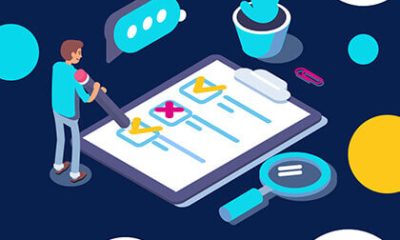
 Make Money Online1 year ago
Make Money Online1 year agoMaximizing Your Earnings With Online Survey Feedback: Top Tips
-

 Lifestyle1 year ago
Lifestyle1 year ago10 Best Water Shoes in 2024: Ultimate Aqua Adventures!
-

 Beauty3 years ago
Beauty3 years agoMy Experience with Anxiety and Depression
-

 Insurance3 years ago
Insurance3 years agoBest Pet Insurance Companies & Plans
-
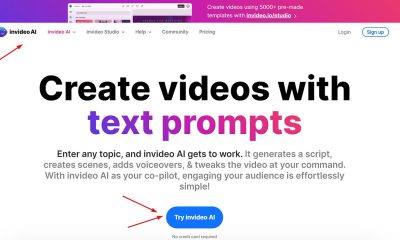
 AppSumo Deals2 years ago
AppSumo Deals2 years agoHow to Create a Video With Invideo Ai in 5 Minutes: Quick & Easy!
-
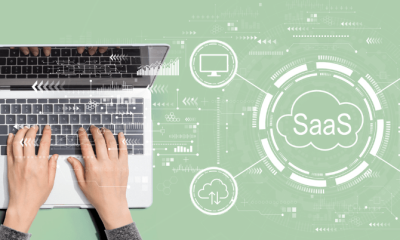
 Software as a Service-SaaS1 year ago
Software as a Service-SaaS1 year ago10 Essential SaaS Tools for Streamlining Your Business in 2024
-

 gadgets4 years ago
gadgets4 years agoDo You Want? ROBLOX Gift Card Code Generator!!!


